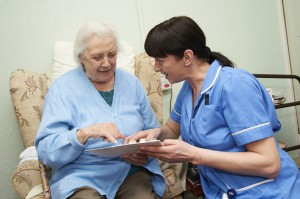 A successful new programme between Solihull Hospital and Solihull Metropolitan Borough Council (SMBC) is helping ease the transition from hospital back into the home for patients.
A successful new programme between Solihull Hospital and Solihull Metropolitan Borough Council (SMBC) is helping ease the transition from hospital back into the home for patients.
Beginning in November 2013, the Supported Integrated Discharge service consists of health professionals from Solihull Hospital and carers and occupational therapists from the Promoting Independence service at SMBC working together to ensure patients regain their independence and health as quickly as possible. The service offers both physiotherapy and occupational therapy assessment and treatment to help promote recovery in the home.
Karen Lewis, therapy site lead at Solihull Hospital, said: “We are thrilled that the Supported Integrated Discharge service has been so well received. Once it has been decided a patient is well enough to return home, the team will discuss any ongoing care needs with the patient and ensure the right level of support is arranged. This often includes help with personal hygiene, meal preparation and medication.
“We are keen to make sure patients regain their independence as quickly as possible after receiving treatment. This has proven benefits, with patients recovering at a significantly faster rate, and we have had extremely positive feedback about the service from patients.”
Solihull Council’s Cabinet Member for Health and Wellbeing, Councillor Bob Sleigh said: “This has been a pioneering partnership between health and social care, with hospital therapists and social care staff working together to provide a package of intervention and care to service users within the home environment. This enables faster recovery and improved quality of life for the service user. The benefits of this scheme extend not only to the service users but to the multi-disciplinary staff across both organisations, with learning and experience shared throughout the development of the service.”






